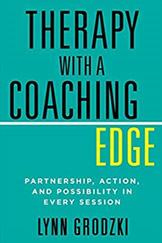Reviewed by Kathryn Metro
Lynn Grodzki’s new book, Therapy with a Coaching Edge, guides professionals who are interested in a model of therapy that incorporates a coaching approach. She begins with a description of the basic model, which is comparable to a combination of traditional psychotherapy and life coaching. She then explores a set of nine specific coaching skills, including asking motivating questions and being more reactive. Grodzki has designed the book to be flexible and suitable for people with varying interests so that professionals can either adopt the complete model or select the concepts and skills that appeal to them the most.
Grodzki clearly states that although she appreciates the value of life coaching, she does not believe that everyone is suited for the approach and that it is geared for a narrow population. The ideal client for a coaching method is one who has a moderate mental health diagnosis, functions normally in most parts of their life, are receptive to a directive action-oriented approach, have a capacity for thinking rationally, and could be comfortable working at a quicker speed with a proactive therapist.
Grodzki goes on to explain that an important part of adopting a coaching edge to therapy involves the therapist. To effectively blend the two—coaching and therapy—therapists must be able to set aside their instincts to remain neutral. Therapists must alter their disposition when considering a coaching role, and should express more authentic interest, which will encourage clients to be part of a two-way conversation with the therapist offering substantial guidance as personal opinion.
She emphasizes the importance of questions in a therapy setting; developing impactful questions is a skill that can be used to elicit change. There are several different types of questions that Grodzki uses to help guide her discussions with clients, including the “miracle question.” Therapists use this type of question—“If a miracle happened and this problem of stress vanished, how would life be different?”— to focus on the goal of eliminating the problem. Not only does Grodski list explicit questions to ask, she also includes tips on how and when to ask them.
Lynn Grodski’s new book legitimizes a therapeutic model that some therapists may have attempted. The book provides explicit advice and examples that are useful in different circumstances. For patients that express interest in meeting specific goals perhaps in a certain amount of time, a coaching model may be beneficial. In a world that is increasingly goal oriented, therapy that is focused on achieving positive outcomes quickly will likely only become more popular. Grodzki provides a novel guide to navigating this approach.
Lynn Grodzki is a business coach for small business owners, and she specializes in working with helping professionals. She is a Licensed Clinical Social Worker in private practice for over twenty-five years and a Master Certified Coach, and she maintains a psychotherapy private practice where she specializes in working with adults who are successful in some areas of life and need help in others.
 Kathryn Metro studies applied psychology at New York University and is set to graduate in 2021. She has interned in classrooms in the Greater New York City area, and has interests in communications, Spanish, and working with children.
Kathryn Metro studies applied psychology at New York University and is set to graduate in 2021. She has interned in classrooms in the Greater New York City area, and has interests in communications, Spanish, and working with children.








